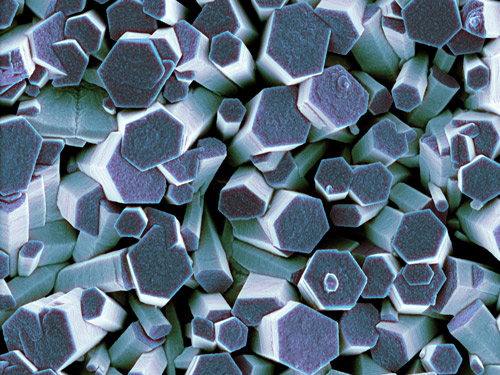 Zinc (chemical symbol Zn) is a transition metal and is usually naturally occurring as zinc sulphide ore compounds (ZnS) such as wurtzite or sphalerite and also smithsonite (zinc spar, ZnCO3) and willemite (Zn2[SiO4]). In foods, zinc is predominantly associated with proteins or in the form of salts.
Zinc (chemical symbol Zn) is a transition metal and is usually naturally occurring as zinc sulphide ore compounds (ZnS) such as wurtzite or sphalerite and also smithsonite (zinc spar, ZnCO3) and willemite (Zn2[SiO4]). In foods, zinc is predominantly associated with proteins or in the form of salts.
Functions of zinc
With a total body store of 1.5 to 2,5 g, alongside iron, zinc is the most dominant trace element in the human body in terms of quantity. 99 % of the body's total stores are found in the cells. Particularly high concentrations are found in the pancreatic islet cells and the prostate cells, the testes and the ovaries.
As a cofactor and constituent of more than 300 enzymes of all six enzyme classes, zinc is required for practically all vital processes – reproduction, growth, differentiation, processing of information, metabolism and immune defence:
- Metabolism of essential nutrients. Zinc is a constituent of glucose, fat and amino acid metabolism enzymes, thus contributing to a normal metabolism of the essential nutrients and supporting the normal carbohydrate and fatty acid metabolism. It also contributes to normal protein synthesis.
- Vitamin A metabolism. Zinc is involved in normal vitamin A metabolism and thus contributes to maintaining normal vision.
- Acid-base balance. Zinc is an activator in the carbonic anhydrase. As such, it supports a normal acid-base metabolism.
- DNA replication and cell division. Zinc contributes to normal DNA synthesis and plays a role in cell division.
- Reproduction. Zinc is an integral component of transcription factors and indispensable for binding these protein complexes to the DNA. Zinc also contributes towards normal fertility and normal reproduction. It also contributes to maintaining a normal testosterone level in the blood.
- Function of hair, skin and nails. Zinc contributes maintaining normal skin and hair and also normal nails. It is therefore also referred to as an “essential trace element”.
- Antioxidant protection factor. Zinc plays a part in protecting the cells against oxidative stress.
- Immune activator. Immune cells are particularly sensitive to zinc. Zinc plays a part here in the normal function of the immune system.
- Collagen synthesis. Vitamin C is essential for the normal collagen formation and thus contributes to maintaining normal bones.
- Nerve function. Zinc supports normal cognitive function.
Useful information.
- Zinc intake from animal-based foods is usually higher than plant-based.
- Amongst the ingredients in plant-based foods which affect absorption, phytic acid plays a dominant role. It forms antisoluble zinc/phytate complexes in combination with zinc.
- Certain proteins and amino acids improve the absorption of zinc from the gut lumen.
- Free bivalent iron competes with zinc for the same transport protein in the wall of the gut. High doses of iron preparations with Fe2+ thus inhibit the absorption of zinc.
Information on production technology
- INTERCELL Pharma produces products with organically bound zinc. The zinc amino acid complex used makes its way through the stomach passage unharmed; irritation of the stomach lining ceases. Zinc is only released out of the amino acid bond in the small intestine. The zinc can therefore be directly absorbed by the intestinal cells and reach the blood which guarantees especially good utilisation.
© Intercell Pharma GmbH



